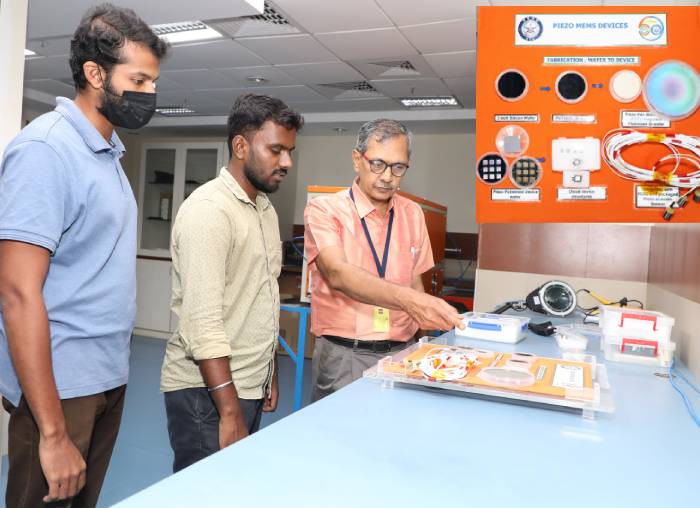
Chennai May 9 2023: The Indian Institute of Technology, Madras has partnered with the Defence Research and Development Organisation (DRDO) Scientists to develop cutting-edge sensor technology for underwater communications, which will be advantageous to defence, particularly naval applications.
The indigenous development of this technology enables the nation to fabricate the devices at a relatively lower cost than the internationally-available foundries where the cost of fabrication is high and the number of foundries is also limited.
The ‘Piezoelectric MEMS technology’ is required to develop high-performance thin films and convert ‘piezo thin film’ into state-of-the-art futuristic Naval Sensors and devices for underwater applications. The Piezo Thin Films are one of the vital components of piezo MEMS devices and are considered for acoustics and vibration-sensing applications.
IIT Madras Researchers led by Prof. Amitava Das Gupta and Prof. Boby George worked along with Dr. E. Varadarajan, Scientist, and Dr. V. Natarajan, Senior Scientis at the DRDO Industry Academia – Ramanujan Centre of Excellence (DIA-RCoE), IIT Madras. They worked with multiple partners for the indigenous development of a piezo MEMS (Micro Electro Mechanical System) process technology to make ‘Thin film membrane based Piezo MEMS Acoustic sensors.’
The establishment of cutting-edge piezo MEMS technology enables India to push the boundaries of defence competencies and allows the nation to execute the strategic operations of critical applications. The large area piezo thin films and MEMS process technology will support the ongoing/ futuristic technologies for the Next-Generation SONAR programme of DRDO for the Indian Navy
The DRDO Laboratories involved in this project include the Naval Physical and Oceanographic Laboratory, (NPOL), DRDO, Kochi, and Naval Science and Technological Laboratory (NSTL), DRDO, Visakhapatnam. Other collaborators include the Armament Research and Development Establishment (ARDE), Pune, Vellore Institute of Technology (VIT) Chennai and Indian Institute of Science (IISc) Bengaluru.
Dr. O.R. Nandagopan, Director, DRDO Industry Academia- Ramanujan Centre of Excellence’ (DIA-RCoE), IIT Madras, said, “This technology is matured enough to convert it as a system with the support of Indian Industry. This technology will be a disruptive technology in this domain and our country achieved ‘Aatma Nirbhar Bharat’ in underwater materials and micro device processing technology.”
Several research groups and Defence laboratories in the U.S., Europe, Korea, Japan and China are involved in the development of technologies. Internationally, several piezo MEMS foundries are making various piezo MEMS devices for both defence and civilian applications. Currently, the piezo thin film-based piezoelectric device market is worth around US$ 5 billion US and is estimated to grow at a Compound Annual Growth Rate (CAGR) of 12 % in the next 3 to 4 years.
The indigenous development of Piezo MEMS technology bridges the technology gaps leading to the development of piezo MEMS acoustic devices for underwater applications. Large dimension (100 mm dia) Piezoelectric thin films were fabricated by both RF sputtering and Sol-Gel technique with good uniformity and higher piezoelectric properties.
Dr. Varadarajan, Scientist, DRDO highlighted that the main challenge in the Piezo MEMS process technology is the need for high reliability and durability in harsh underwater environment, high pressure and corrosive nature of seawater.
The piezo MEMS process recipe has been successfully developed jointly with DRDO team for the complete fabrication of an acoustic sensor, without degrading the functionality of the piezo thin film. The fabricated PZT thin film-based acoustic sensor exhibits higher performance than the conventional PVDF-based acoustic sensor. This cutting-edge sensor technology allows the researchers to fabricate high-performance piezo MEMS acoustic devices, which will be advantageous to defence applications.